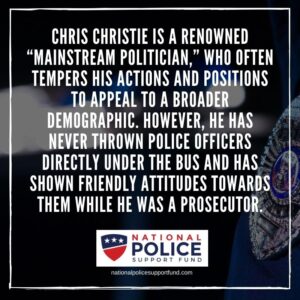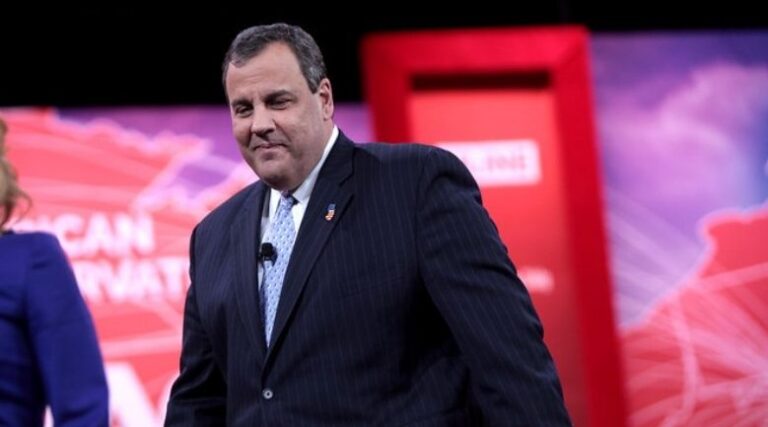With only a few months left before the Iowa presidential caucuses, the Republican nomination process is still technically open. Nevertheless, many conservative voters already have a favorite among a varied deck of possible cards – but there are just as many voters who still see the scene with puzzlement and confusion.
At National Police Support Fund, our priority is to ensure whoever wins the nomination is ready to support law enforcement at all levels, from local police officers to the larger principles behind the rule. As part of these efforts, we’re taking a close look at each of the main candidates. We want to support someone who’s not only willing to defend police officers publicly, but those whose actions match the intention.
Today is Chris Christie’s turn. The former governor of New Jersey is one of the leading figures of the modern Republican Party. But what has he done for law enforcement so far? Is his voting record enough to consider him a reliable ally?
Who is Chris Christie?
To get a full picture of a possible President Christie, we need to start at the beginning. Chris Christie is a Newark, New Jersey native, brought up in an everyday middle-class, bipartisan family. His first foray into politics happened while still in high school after he was elected class president at Livingston High School. At the same time, he also volunteered for Tom Kean’s gubernatorial campaign.
Then, he continued his education at the University of Delaware and the Seton Hall University School of Law. After gaining admittance to the New Jersey State Bar, he started a private practice that specialized in securities law and government affairs.
The connections made during this stage were the tinder for a successful political career. In 1994, he was elected as a legislator for Morris County, New Jersey. The following year, he made a bid for the New Jersey General Assembly, which although unsuccessful, brought him local notoriety.
In 2001, President George W. Bush appointed him as U.S. attorney for New Jersey. He held this office until 2008, and during his time, he prioritized prosecutions against organized crime rings and corrupt public officials. In 2009, he ran for the office of governor for the first time. Thanks to a landslide 2013 re-election, he remained Governor until 2018.
Where Does Chris Christie Stand on Law Enforcement?
Chris Christie’s political career – both as an elected official and as a lobbyist – has brought him closer to a vast array of issues. However, he has rarely put Law Enforcement at the forefront of any of his campaigns.

At the same time, neither has he dodged powerful statements at times of crisis. Back in 2015, when the “Black Lives Matter” protests first occupied national headlines, he was among the first to speak out against their excesses:
“I don’t believe that movement should be justified when they are calling for the murder of police officers.”
Although few media figures spoke so openly at the time, he openly warned about the movement’s rhetoric, which “could put police officers at risk.”
In the wake of Atlanta’s “Cop City” protests, he stood by the law enforcement officers at the scene and defended their right to use force when facing violent rioters.
Do His Words Match His Actions?
Chris Christie’s tenure as Governor provided him with frequent opportunities to protect local police officers, both directly and by creating a safer environment in which to operate.
And yet, his track record looks surprisingly short. He rarely sponsored or vetoed bills on the topic directly, although he frequently intervened in “law enforcement adjacent” topics.
Some of the clearer examples include:
- A key vote on Bill A 4265, which influenced recruitment and hiring for police and fire departments
- He vetoed a gun control bill that would have placed additional restrictions on ammunition magazines.
- He signed into law a new bill that expanded funding to train law enforcement officers, especially for dealing with sexual violence.
- He vetoed a bill that aimed to reduce penalties for those convicted of Driving Under the Influence
Final Thoughts
Chris Christie is a renowned “mainstream politician,” who often tempers his actions and positions to appeal to a broader demographic. However, he has never thrown police officers under the bus and has shown friendly attitudes towards them while he was a prosecutor.
Whoever wins the Republican Presidential nomination will have the power to shape public discourse well beyond the election. But should this responsibility fall onto Chris Christie? The jury is still out.
Review our other 2024 candidate spotlights here.
Image Credit: Photo by Gage Skidmore on Flickr








